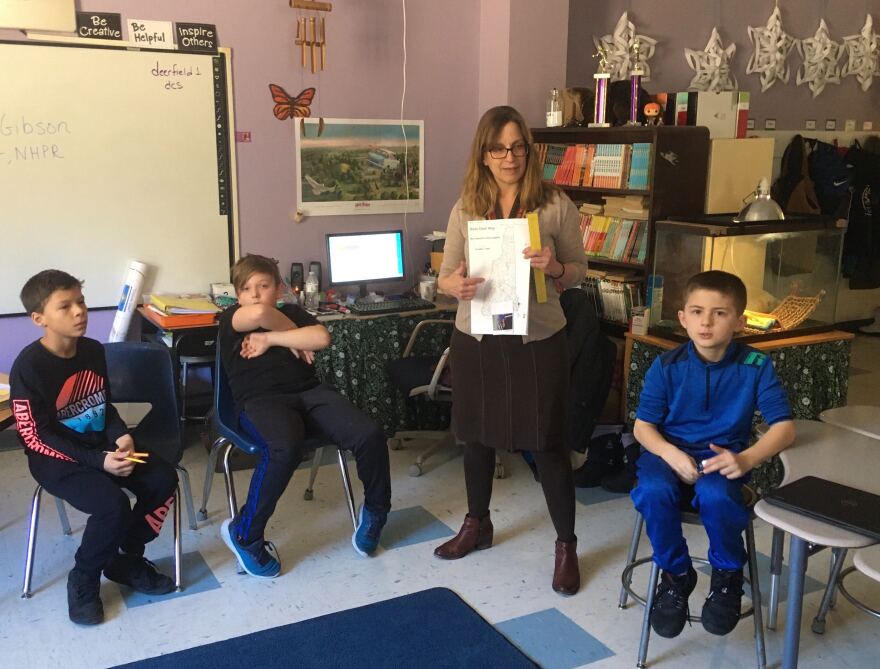All eyes are now on the New Hampshire primary, and some elementary school teachers are trying to explain the process to students without getting caught up in partisan politics.
NHPR’s Sarah Gibson brings us to a 4th grade class at Deerfield Community School that’s trying it out.
9 year-old Allison Carlson is counting the days Tulsi Gabbard has campaigned in New Hampshire this past month. Once she hits 24, Allison says Gabbard is decidedly “not lazy.”
“She wants people to vote for her, so there’s more of a chance for her to become president.”
This whole notion of campaigning is pretty new to Alison and most of her classmates; they were in kindergarten the last time this happened, and they just started the primary lesson a few days ago.
To review the basics, their teacher Sue Laskowsky gathers her class in a circle and asks them to imagine that they’re candidates trying to woo voters.
“What do you do to let them know what your ideas are?”
“You can do retail politics!” several kids yell at once.
“Tell me a little more about retail politics.”
Three hands shoot up.
“Let’s start with Joe.”
Joseph Carroll, sporting a spiderman sweatshirt, explains that it’s about meeting people in person and answering voters’ questions.
“People who ask them questions are trying to see if they’re actually lying or not,” adds Kaleigh Griffin.

Then Jack Goodridge chimes in, explaining that voters here “strain the information” for the rest of the country.
“Yes, we’re kind of finding out what they believe in and what their plans are if they become president,” Laskowsky says. “So we have a pretty big job here in New Hampshire right?”
New Hampshire politicos place a lot of weight on that “big job,” and they’re working hard to protect it. But until now, teachers didn’t have much material to help them explain all this. The new curriculum, called “Moose on the Loose,” is geared towards 4th grade, because that’s when public school students study New Hampshire.
Elizabeth Dubrulle, Director of Education and Programs at the New Hampshire Historical Society, helped lead the team that created the curriculum, as part of a million-dollar, multi-year effort to develop free social studies materials and training to elementary school teachers across the state.
“We really felt kids should know about: What is the New Hampshire primary, why it’s important, what is unique about it, what does New Hampshire contribute that other states don’t?” she says.
Many teachers are nervous to delve into the topic.

“They themselves are probably not very familiar with the New Hampshire primary - I don’t think many adults are,” says Dubrulle.
Others fear teaching any subject that could become partisan. Some teachers have watched mock elections lead to bullying and hurt feelings; others have been accused of steering students towards their own political beliefs. So the lesson plans in the “Moose on the Loose” primary unit focus less on candidates, and more on the history and cherished traditions of the primary.
In one exercise, called the “diner dash,” students armed with rulers, markers, and maps of New Hampshire fan out in pairs to choose three diners they would visit if they were campaigning.
The Puritan Backroom gets a lot of play.
“We chose the backroom in Manchester because it’s really big and you can talk to a lot of people,” reads Joe with his partner Devon Miles.
The pair now have to measure the distance between their diners in Manchester and Concord, and convert that distance from inches to miles. This math component is intentional. Social Studies gets far less time in schools than it used to, in part because students don’t get tested on it.
So, the logic goes, the more this curriculum incorporates tested subjects like math and language arts, the more teachers will use it. And Laskowsky says rolling it out in a primary year makes it more exciting.

Students say they see campaign ads every day on TV and social media - now, they have a way to place this in context. And just a few days into the lesson, the primary gears are turning.
Laskowsky says students recently told her that college campuses would be a great place to do “retail politics.”
“I said yeah that will be a great place to vote, and you guys will be new voters in two more elections! And they were like, ‘What?’” she laughs.
And at the end of this primary unit, Laskowsky plans to raise a big, controversial question: Is it fair that New Hampshire gets to vote first? She says she personally believes it is, but in her classroom, it’s up to the students to decide.








